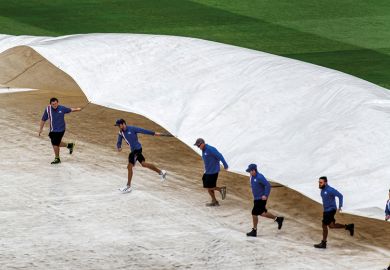As Australian ministers move to freeze funding and increase paperwork for the country’s researchers, a government-dominated committee says the opposite approach is needed.
A new House of Representatives report calls for researchers to be relieved of obligations to provide a “voluminous amount of information” in applications for grants that they are statistically unlikely to win. It recommends a two-step application process, with full proposals and budgets only required by teams that survive the first stage.
The committee also wants the government to introduce a single online system to manage all grant applications, with links to existing databases that can autofill much of the required information. The government should also minimise researchers’ administrative workload by standardising grant funding documentation and eliminating demands for information that is either irrelevant or already available, the report says.
Research block grants should also be reviewed to better cover “indirect” research costs like consumables, technical staff and laboratories, it says. It cites a claim that Australian universities are allocated less than one-third of the funding their UK counterparts receive to meet these expenses.
“[This] creates a perverse system that effectively costs successful universities when they win competitive grants,” the report says. “It requires universities to increasingly cover these indirect costs through other revenue such as general university funds and international student fees.”
This situation is set to get worse, after the government announced that it would freeze the key funding scheme for indirect research costs, using the savings to bankroll an expansion of regional university provision. Details of how long this freeze will last are due to be outlined in a mini-budget expected by the end of the year.
The government is also introducing a new national interest test for grant applications, considered by many to be redundant, in response to the furore generated by former education minister Simon Birmingham’s vetoing of 11 humanities research grants.
Committee chairman Andrew Laming, a member of the governing Liberal-National coalition, said that researchers already spent “significant” time, effort and resources applying for funding. “With low success rates, it is often implied that this time and effort is wasted,” he said.
The report delivers unqualified support for peer review as “the best process for determining the allocation of grant funding”. But it also endorses the cultivation of strategic research priorities “to maximise Australia’s research investment”.
It also advocates lowering the minimum funding thresholds for some grant schemes, saying viable projects in some areas – including chemistry and the humanities – could be bankrolled for less. It cites a claim that applications requesting less than A$100,000 (£56,000) a year “are not taken seriously by reviewers and are almost never funded”.
The report also criticises the Australian Research Council’s “costly and labour-intensive” exercises to assess research excellence and impact. It cites evidence that these activities can cost the sector up to A$80 million per round, costing each university up to A$1 million and staff time to provide information that is often published elsewhere.
It recommends that universities no longer be required to provide any information that is already available, and that the timing of the data collection for the two exercises – Excellence in Research for Australia and the Engagement and Impact Assessment – be reduced from three to five years.
Australia should also consider participating in international research funds such as Horizon Europe, the report says.
Register to continue
Why register?
- Registration is free and only takes a moment
- Once registered, you can read 3 articles a month
- Sign up for our newsletter
Subscribe
Or subscribe for unlimited access to:
- Unlimited access to news, views, insights & reviews
- Digital editions
- Digital access to THE’s university and college rankings analysis
Already registered or a current subscriber?








